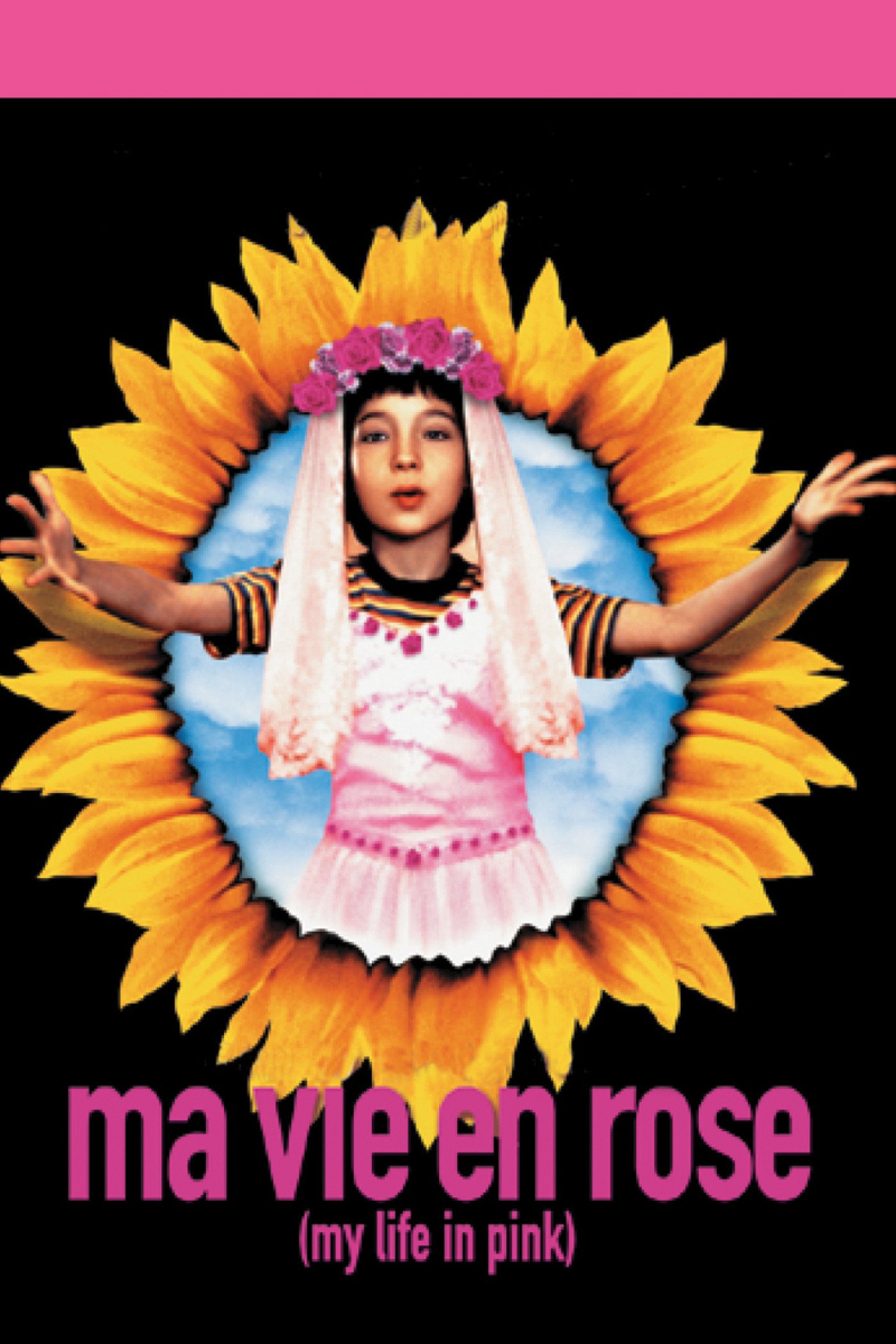Ma Vie En Rose (“My Life in Pink”) (1997)

| |
| Directed by | Alain Berliner |
|---|---|
| Running time | 1h 29m |
| Core concepts this week |
non-narrativity queer failure cissexism oppositional sexism traditional sexism trans-misogyny |
| View on Amazon Prime | |
Film background
Ma Vie En Rose was directed by Alain Berliner. It won Best Foreign Language Film at the 1998 Golden Globe Awards. Berliner is Belgian, and the film was primarily shot in France. The film was given an R rating by the MPAA despite the fact that it has virtually no violent or sexual content; some have argued this rating is due to the transphobia inherent in the MPAA rating system.
Plot summary
At the start of the film, the Fabre family–Hanna (Michèle Laroque), Pierre (Jean-Philippe Écoffey), and their four children have just moved to a new house in a suburban neighborhood, where Pierre is starting a new job. The neighborhood is close-knit and some of the neighbors work together. As the film opens, the Fabre family hosts a housewarming party, and their youngest child, Ludovic, (Georges Du Fresne) who was assigned male at birth, appears in a dress. Ludo’s parents encourage her to stop dressing in feminine clothing, but her grandmother, Elisabeth (Hélène Vincent), is more understanding. Ludovic escapes from the transphobic pressures at school and home by imagining a fantastical world she shares with her favorite television character (Delphine Cadet), Pam, who is a Barbie-like figure. As pressure mounts from the neighbors, Ludo’s parents take her to therapy to try to encourage her to conform to a masculine identity. During a school play, Ludo barricades the girl who is assigned to the role of Snow White in the bathroom and takes the role for herself. This leads the school to expel Ludo, and Pierre loses his job. Faced with mounting pressure, Pierre and Hanna begin to express rage and act violently towards Ludo, resenting her for their family’s challenges. Ludo briefly goes to stay with Elisabeth to escape the family’s resentment. Eventually, the Fabre family moves to a new neighborhood, where Ludo befriends Chris (Raphaelle Santini), who was assigned female at birth, and who presents as masculine. After a conflict at Chris’s party in which Hanna attacks Ludo for switching costumes with Chris, Ludo’s parents tell her she can wear what she likes and that she will always be their child; however, the ending is abrupt and therefore somewhat ambiguous.
Content warnings
Ma Vie En Rose contains physically and emotionally abusive behavior towards a young child, as well as a suicide attempt by a young child (sitting in an icebox).
Notes
- Note: Day 1 of this week includes a scene analysis alongside another brief excerpt from Cruising Utopia. You could assign this excerpt for students to read alongside their screening of Ma Vie en Rose, prior to this week’s class, or you could have students read it together during the Day 1 class period. Alternatively, you could skip this text excerpt and close-read the scene without it!
- Because of the relative difficulty of Schiavi’s text compared with Serano’s, and because Schiavi’s text presents good opportunities to discuss the end of the film, Day 2 involves queer theory (Serano) and Day 3 involves film criticism (Schiavi).
- Scholarship on Ma Vie en Rose uses various pronouns to refer to Ludovic. Throughout these lesson plans, I will use “she/her” pronouns to refer to Ludo, due to Ludo’s explanations throughout the film that she is a girl. Schiavi’s article includes “he/him” pronouns. One could argue it would be more appropriate to use “they/them” pronouns or simply refer to Ludo as “Ludo.” You could discuss with your class the challenges of speaking and writing about a character who is given few opportunities to explain herself.
Materials this week
- Lesson plans [Word doc]
- Screening quiz [Word doc]
- Secondary texts:
- Day 1: Esteban Muñoz, Jose. Cruising Utopia: The Then and There of Queer Futurity. NYU UP, 2009. (Excerpt provided: selection from pp. 172-177) [pdf]
- Day 2: Serano, Julia. Whipping Girl: A Transsexual Woman on Sexism and the Scapegoating of Femininity. Seal Press, 2007. (Excerpt provided: “Trans Woman Manifesto,” pp. 12-20) [pdf]
- Day 3: Schiavi, Michael R. “A ‘Girlboy’s Own Story: Non-Masculine Narrativity in Ma Vie En Rose.” College Literature vol. 31, no. 3, 2004, pp. 1-26. [pdf]